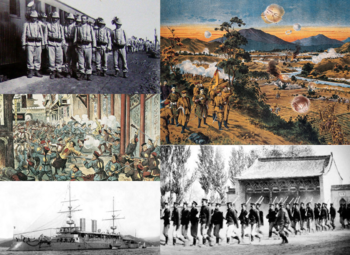Etrurian-Shangean War
| Etrurian-Xiaodongese War | |||||||
|---|---|---|---|---|---|---|---|
 Clockwise from top left
| |||||||
| |||||||
| Belligerents | |||||||
|
Supported by |
| ||||||
| Commanders and leaders | |||||||
|
|
| ||||||
| Strength | |||||||
|
760,000 (total)
| Less | ||||||
| Casualties and losses | |||||||
|
40,000-60,000 killed ~100,000 died of wounds or disease Total: 140,000-160,000 | Less | ||||||
The Etrurian-Xiaodongese War (Vespasian: Guerra Etruriana-Hiautungese; Xiaodongese 饿唾利亚战争, Ètuòlìyǎ Zhànzhēng "Etrurian War") was a war fought between Xiaodong and Etruria for a little over a year from 1886 to 1888 over ownership of the Kaoming peninsula in Xiaodong. The war was predominantly fought on the Kaoming peninsula and in the Bay of Bashurat in Xiaodong. The direct cause of the war was a dispute over the so-called "neutral zone" between the Etrurian concession of Kaoming (modern day Gaoming) and Xiaodong, but it was motivated by growing Etrurian encroachment over Xiaodong that sought to expand further into the Kaoming peninsula and Chanwa as well as rising Xiaodongese nationalism that resented the continuation of unequal treaties with Euclean powers such as Etruria.
The Etrurian annexation of Kaoming in 1858 and its assumption of suzerainty over Kumuso afterwards led to an increasing sense in Xiaodong of Etrurian encroachment of Xiaodong, especially as Etruria further colonised much of Satria giving it a large degree of control of the Bay of Bashurat. Xiaodongese leaders saw an Etrurian annexation or vassalisation of Senria and the Kaoming peninsula as highly likely and began resisting further Etrurian domination of the area via its own annexations of Dakata and Chanwa and a vigorous modernisation of its military.
The Etrurian monarchy under Caio Augustino had faced persistent unpopularity for years, especially under the unpopular premiership of Girolamo Galba. The Etrurian government believed that a war with Xiaodong would easily result in an Etrurian victory failing to recognise the rapid modernisation Xiaodong had embarked on since the 1870's and that a successful annexation of the Kaoming peninsula would undermine Gaullica's presence in the Bay of Bashurat (exercised through Sangte and Jindao) as well as reviving the flagging popularity of the Etrurian monarchy.
In October 1886 the Etrurian governor of Kaoming General Lasagne claimed that Xiaodong had persistently violated the demilitarised neutral zone between the Etrurian concessions of Kaoming and Porto Haikien (Port Haijian) and demanded that Xiaodong cede the neutral zone directly to Etruria as well as approve of the creation of an Etrurian protectorate in the peninsula to assure the interests of Etruria in the region. Xiaodong offered to cede the neutral zone but refused to approve of the creation of a protectorate; on the 7 November 1886 Xiaodong performed a surprise attack on the Etrurian positions in Kaoming and Porto Haikien, seizing the latter but being quickly repelled in the former. The two sides subsequently declared war on each other.
The war was hotly contested on the Kaoming-Wangzhuang railway, with Etrurian military strategy being to seize the city of Wangzhuang thereby cutting the Kaoming peninsula off from the rest of Xiaodong and increasing the Kaoming Army's ability to supply itself during the war. The Etrurian government expected the Xiaodongese to be poorly armed and trained and so sent little supplies to either the Kaoming Army or Bashurat fleet. The Etrurian advance into Xiaodong was much slower and more difficult then was anticipated by Etrurian generals, suffering several major defeats by more numerous Xiaodongese forces.
In the autumn of 1887 Etruria attempted to deliver a knock-out blow to Xiaodongese forces by winning a decisive naval engagement in the Bay of Bashurat before landing in the city of Lukeng and cutting off Xiaodongese forces from the north of the peninsula. Whilst Etruria would win the Battle of the Bay of Bashurat destroying much of the Xiaodongese fleet they suffered heavy casualties and were forced to land on the much less defensible town of Jungfa. The Battle of Jungfa between Xiaodongese and Etrurian forces saw the Etrurians decisively defeated mainly by the Gaullican trained and equipped Third Army. Following the Battle of Jungfa Etrurian forces were pushed back by Xiaodong's advance as the war became more and more unpopular in Etruria. By February 1888 Etrurian forces had been pushed back to Kaoming, with Xiaodong occupying the neutral zone and Porto Haikien.
The subsequent peace treaty saw Etruria agree to hand over Porto Haikien to Xiaodong as well as sell its shares to Xiaodong in the Kaoming-Wangzhuang railway. Xiaodong was also granted the right to militarise the neutral zone and cancelled all prior treaties with Etruria in exchange for recognising a new lease of 70 years for the territory of Kaoming. The Xiaodongese acceptance of continued Etrurian ownership of Kaoming was seen as a way to save face for Etruria, whose humiliating defeat to a Coian country was one of the reasons for the San Sepulchro Revolution a month later that deposed the Etrurian monarchy and led to the Second Etrurian Republic.
The victory of a Coian power over a Euclean one was considered to be a major event in south Coius, inspiring anti-colonial movements as well as consolidating Xiaodong as a great power. The success of Xiaodongese forces led Gaullica in particular to increasingly to court Xiaodong culminating with the Entente alliance between the two in 1922.